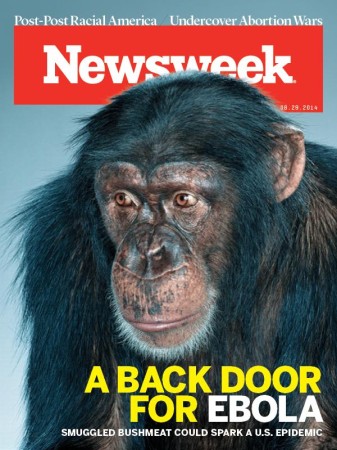Newsweek’s Dehumanization of Africans and Monkey Meat Ebola Fearmongering

It’s 2014, and a national magazine has a cover story about how African immigrants might spread a deadly virus in the United States, thanks to the peculiar and unsanitary food they eat. The cover image is a photo of a chimpanzee.
Yes, this really happened.
“A Back Door For Ebola: Smuggled Bushmeat Could Spark a US Epidemic” read the headline on the August 29 Newsweek, a profoundly shocking image and message that immediately drew criticism like this:
When clickbait, racism and dog whistling to white American readers meet on @Newsweek cover; see @dadakim‘s tweets pic.twitter.com/6T3J2SGtkk
— Africa is a Country (@AfricasaCountry) August 23, 2014
But the problems of the piece were bigger than just the cover. The piece is built around the idea that illegally imported “bushmeat”–what we would call “wild game” if it were being eaten in the United States–could carry the deadly Ebola virus.
Newsweek‘s Gerard Flynn and Susan Scutti note that “social media have been ablaze with fearmongering,” and they include as evidence a “highly publicized tweet from Donald Trump.”
But is there any evidence that imported meat could actually carry Ebola? On that score, Newsweek comes up empty. The article cites a “memo obtained by Newsweek that circulated among customs officers and agriculture specialists in 2007 [that] noted that bushmeat is ‘a potential vector of diseases such as Monkeypox, Ebola Virus, Severe Acute Respiratory Syndrome (SARS) and other communicable diseases.'” Who produced this seven-year-old memo? Newsweek doesn’t say.
The magazine’s strongest case seems to come when it reports that while “researchers cannot identify with absolute certainty the cause of the current Ebola outbreak, they do know the strain of virus, while being similar to the Zaire strain, is indigenous to Guinea, suggesting bushmeat was the source.”
But that link goes to a Reuters story that does not appear to say what Newsweek thinks it’s saying. That piece notes that “according to scientific evidence, the main risk of human infection by Ebola or Marburg is not thought to be from all bushmeat, only from infected animals and only from fresh carcasses.” The main expert in the piece, University of Pretoria virologist Bob Swanepoel, seems to be saying this:
Despite the fears over bushmeat, Swanepoel says study of Ebola and Marburg outbreaks since 1976 indicate it is close contact with bats in particular that seems to be behind the transmission to humans of the deadly virus.
The idea that Ebola is spread through direct contact with certain kinds of infected animals and freshly slaughtered carcasses is quite different than the story Newsweek is pushing:
While the focus remains on the passengers of trans-Atlantic flights, there is an additional risk—all but ignored by the popular press and public—lurking in the cargo hold below: bushmeat contaminated with the virus and smuggled into the US in luggage.
The most definitive takedown of the Newsweek piece appeared at the Washington Post website (8/25/14), where Laura Seay and Kim Yi Dionne place the article in a historical context:
Far from presenting a legitimate public health concern, the authors of the piece and the editorial decision to use chimpanzee imagery on the cover have placed Newsweek squarely in the center of a long and ugly tradition of treating Africans as savage animals and the African continent as a dirty, diseased place to be feared.
While Newsweek zeroed in on the wild game risk as being “all but but ignored by the popular press and public,” Seay and Dionne write: “The reason this ‘risk’ is ignored is because it is infinitesimally close to zero.” 
During a BBC discussion of the story (8/26/14), host Nkem Ifejika noted that Ebola experts stress that the risks of Ebola exposure come from hunting and dissection–which would seem to undermine the point of Newsweek‘s cover story. The magazine’s senior editor Elijah Wolfson responded by appearing to back away from the article’s premise:
I would say that the risk for contracting Ebola by eating or handling bushmeat that arrives in the U.S. through illegal importation is minimal. But that doesn’t mean it is a zero risk.
That’s a far cry from the message the magazine is telling us–unless they plan on rewriting that headline to say, “Not a Back Door for Ebola: Smuggled Bushmeat Is Unlikely to Spark a US Epidemic.” And replacing the chimp with a photo of a bat. As Seay and Dionne put it:
Newsweek’s piece is in the worst tradition of what journalist Howard French calls “Ooga-Booga” journalism: the practice of writing in exoticizing and dehumanizing ways about Africa.

